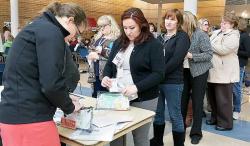- District
-
Schools
-
Welcome to our schools
-
Find Your School
School Boundaries
ELEMENTARY
Antonia Crater Elementary Dundee Elementary Edwards Elementary Ewing Young Elementary Joan Austin Elementary Mabel Rush Elementary -
SECONDARY
Chehalem Valley Middle School Mountain View Middle School Newberg High School CatalystVIRTUAL
COA Virtual Program
-
Find Your School
School Boundaries
-
-
Academics
-
Learning for the 21st Century
-
-
Parents/Students
-
Connecting School and Home
- Attendance and Grade Info Bus Transportation Childcare Community Resources Complaint Process Counseling Services School Start and End Times Delays / Closures E-Friday Folder Enroll / Transfer
- Federal Notifications Get Involved Health Services Learning Resources Menus ParentVUE Student Records Student Safety/Report a Tip Student Code of Conduct Volunteer
-
- Staff
In The News: Poverty simulation proves powerful
Written by: Seth Gordon, Newberg Graphic
School district — More than 600 Newberg teachers and staff have their eyes opened to the barriers that exist for low income families
With no classes Nov. 23, Newberg School District teachers and staff had the chance to briefly walk in the shoes of some of their most impoverished students and families.
With nearly half of the district’s 5,224 students considered “economically disadvantaged,” the district took the entire day to host a poverty simulation intended to shed some light on the barriers facing those living in poverty.
Considering 600-plus staff members participated in what proved to be a much more engaging training exercise than many may have anticipated, Superintendent Kym LeBlanc-Esparza considered the day of professional development an unbridled success.
“There’s no book we could have read, there’s no speaker we could have brought in, there’s nothing we could have done to give people the kind of common experience that they had in a day and the insight they got from actually participating in it,” LeBlanc-Esparza said. “It was great to be able to begin the dialogue about what does it mean to be a family with limited means and what kinds of decisions you need to make.”
The day was split into morning and afternoon sessions and each staff member was given a role to play, including both students and parents, in an impoverished family.
Numerous stations representing institutions in the community were set up around the Newberg High School commons, from banks, employers, utilities and social services to pawn shops, grocery stores, child care facilities and, of course, a school.
Playing the roles of rent collector, caseworker, teacher and others in the simulation were volunteers from the community, including school board members Todd Thomas and Mindy Allison, Mayor Bob Andrews and interim city manager Steve Rhodes. Several Newberg High School students volunteered to help set up and run the simulation, with district leaders leading debriefing sessions for staff afterward.
Staff members were then tasked with completing numerous monthly tasks, like paying rent and bills, securing help from social services and shopping, at a quick pace and often without enough means to make ends meet.
Although the simulation may seem quite simple and artificial on the surface, staff were quickly engaged in the exercise and many reported finding it quite revealing.
“It was a really good experience to make you keep in mind that we don’t always know what these families, what these students are dealing with and how hard it is when you’re living in that situation,” NHS activities director Mark Brown said. “Just the simplest daily tasks that we take for granted all of a sudden become a big hardship, not just on one or two people but the whole family.”
For NHS principal and assistant district superintendent Dave Parker, who often defaults to a cerebral approach to his job and education, the immediacy created by the simulation was unavoidable.
“You couldn’t stay in your head on this,” Parker said. “You felt something, whether it was anxiety or whatever. You couldn’t just analyze this and I think that was really important for our teachers to experience that and feel it in their heart because we can spend the next year and a half talking about how we’re going to solve and begin to change instruction and do some of those things, but it starts with a real appreciation for that situation.”
During the debriefing sessions with staff afterward, LeBlanc-Esparza and district leaders asked participants two simple questions: “How many of you talked to your kids about school?” and “How many of you actually asked about homework.” The response was telling: less than 10 out of 300 in the room to the former and never more than two to the latter.
“There was a realization that there were too many other things that had to be taken care of,” LeBlanc-Esparza said. “You constantly hear ‘these parents don’t come because they don’t care,’ so the question to our staff was, ‘Do they care?’ The answer was, ‘Yes, but they can’t be there.’ There was an understanding that we may have been making some assumptions, not on purpose, but from a standpoint of not understanding what the dynamic really was. So there was great dialogue.”
Community volunteers not only reported that district staff members were participating wholeheartedly, but that it also opened up their eyes.
“It became not just a Newberg School District experience, but it became a Newberg experience because we had the mayor, we had the city manager, we had city council members,” LeBlanc-Esparza said. “We had folks who lead out in our community. It wasn’t just us.”

